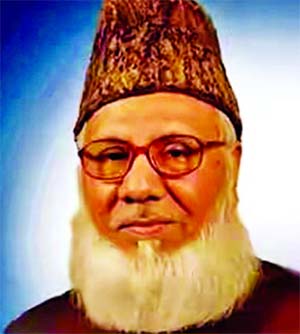
Country’s top war criminal Motiur Rahman Nizami was finally hanged in the wee hours of Wednesday for the horrendous crimes he had committed against humanity during the Liberation War in 1971 to thwart Bangladesh’s independence. After long six years of trial, the 73-year-old Ameer of Bangladesh Jamaat-e-Islami was hanged in Dhaka Central Jail at 12:10am. “Motiur Rahman Nizami was hanged at 12:10am for his crimes against humanity,” said Senior Jail Super of Dhaka Central Jail Jahangir Kabir while talking to reporters at the jail gate around 12:30am. Acting Inspector General (Prisons) Col Iqbal Hasan, Civil Surgeon Abdul Malek Mridha, deputy commissioner of Dhaka Mohammad Salauddin and Jail Jahangir Kabir were present during the execution. Jail sources said the body will be sent to his village home at Manmathpur in Santhia upazila of Pabna where he will be buried. Earlier, Nizami, the 1971 commander-in-chief of Al Badr, a secret killing squad of Jamaate-e-Islami, was given the final bath followed by an imam administering him ‘tawba’ (seeking pardon to the Almighty), an Islamic ritual, in line with the practice ahead of hanging. Hours before the execution, family members of Nizami, who served as the Industries Minister during the 2001-2006 BNP tenure, were allowed to meet him inside the central jail. With the latest execution, five war criminals have so far been executed, while two others – Jamaat leader Ghulam Azam and BNP leader Abdul Alim who had been sentenced to imprisonment unto death – died in jail. Earlier, Jamaat leaders Abdul Quader Mollah, AHM Kamaruzzaman, Ali Ahsan Mohammad Mojaheed and BNP leader Salauddin Quader Chowdhury were executed as they had been awarded death penalty for their crimes against humanity in 1971. Earlier, the full verdict of the Supreme Court rejecting the review petition of condemned war criminal Motiur Rahman Nizami was released on Monday. Later, a copy of the verdict reached the Dhaka Central Jail around 7:05 pm and it was read out to Nizami. Nizami was shifted to the Dhaka Central Jail from Kashimpur Central Jail in Gazipur on Sunday night. On May 5, the Appellate Division rejected the petition of Nizami seeking review of its earlier verdict upholding the death penalty awarded by the International Crimes Tribunal. On March 15, the ICT issued a death warrant for Nizami for his crimes against humanity during the Liberation War in 1971 after the apex court released the full text of its verdict upholding his death penalty. On January 6, a four-member bench of the Appellate Division, headed by the Chief Justice, upheld the death sentence of the Jamaat-e-Islami Ameer dismissing his appeal petition. The Appellate Division upheld the ICT-1 order sentencing Nizami to death for the wartime crimes, including genocide and murder of intellectuals. The apex court upheld his death penalty on three of the four counts, while he was acquitted in one. The SC upheld his life term imprisonment on two charges, out of four in connection with the arrest, detention, torture, and murder of three people, including headmaster Maulana Kasim Uddin of Pabna Zila School on June 4, 1971, complicity in torture, murder and rape at Mohammadpur Physical Training Institute in Dhaka, and murder of Badi, Rumi Jewel and Azad at Old MP Hostel in Dhaka on August 30, 1971. The Appellate Division acquitted the Jamaat leader on two other charges. On October 29, 2014, the ICT-1 sentenced Nizami to death for committing crimes against humanity during the Liberation War. Nizami filed an appeal with the SC on November 23, 2014 challenging the death sentence and claimed himself innocent while refuting all the charges. On July 29, 2010, the Jamaat chief was arrested for allegedly hurting religious sentiments. He was shown arrested on August 2 the same year for committing crimes against humanity during the Liberation War and the trial began nearly two years later on May 28, 2012. Born on March 31, 1943 in Pabna’s Santhia upazila, Nizami rose to the rank of president of East Pakistan unit Islamic Chhatra Sangha (ICS), the student wing of Jamaat, in 1960. Later, he became the president of West and East Pakistan ICS (now Islami Chhatra Shibir) in 1966. During the country’s Liberation War in 1971, then 28-year-old Nizami was the chief of Chhatra Sangha and the supreme commander of the notorious militia group Al-Badr which brutally killed and tortured many pro-independent forces and their family members. He had also played a key role in the formation and running of the Razakar and Peace Committee that helped Pakistani occupation forces. After the Liberation War, Nizami along with his guru Ghulam Azam fled to the UK. After the assassination of Father of the nation Sheikh Mujibur Rahman in August 1975, military ruler Ziaur Rahman permitted Ghulam Azam and Nizami to return to Bangladesh in 1978, paving the way for the revival of Jamaat’s politics. In 1991, Nizami was elected an MP from Pabna-1 constituency with Jamaat ticket. Nizami took over as the Ameer of Jamaat from his guru Ghulam Azam in 2001. In the same year, he was again elected MP from Paban as his party had joined the election under the banner of BNP-led four-party alliance. As the four-party alliance formed the government, Nizami had been inducted in the cabinet and served as the agriculture minister until 2003 and thereafter as industries minister until 2006. Nizami was defeated in the December 2008 general election as a candidate of the Four-Party Alliance.–Dhaka, UNB

